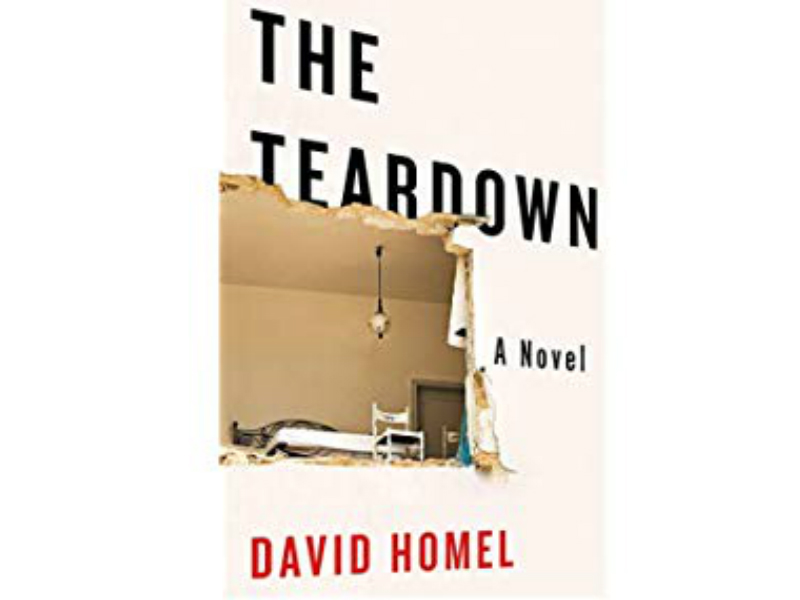Stories of parents abandoned by their child pack a brutal punch.
Alice Munro’s collection of short stories, Runaway, includes a portrait of an aging mother who is haunted by the mysterious disappearance of her daughter. In Philip Roth’s 1997 masterpiece American Pastoral, a father’s life is undercut by his daughter’s commitment to a radical group reminiscent of the Weather Underground and then to an extreme form of Jain asceticism. The father-daughter relationship at the heart of David Homel’s novel The Teardown follows some of these patterns, though the narrative heads for a different conclusion.
Its main character is Phil Brenner, a journalist who’s in the midst of a mid-life crisis while his industry is crumbling around him. At odds with himself, he hangs around the house, travels to his therapy appointments and muses over what he might do to escape what he calls his “slump.”
Brenner’s family lives on the outskirts of Chicago, though that geography is depicted generically, so the nearby city and its home country are hardly named. The locale’s past comes into focus when Brenner recalls his boyhood: “When the Burlington local stopped at the station in the meagre shopping district in his neighbourhood as evening fell, it would bring the early edition of the Sun-Times. Even before the train ground to a halt with that metal-on-metal sound he loved, the conductors would be throwing off bales of newspapers.”
The area’s contemporary character is coloured with an unsettling American ennui: “Out here among the fields, with the strip malls and hotels with giant conference rooms and mammoth grocery chains, everything outsized, dwarfing the customer, personnel was required to stock the shelves and change the sheets on the beds and mop up the spilled drinks after hours. The people who did these essential tasks came from Honduras, El Salvador, Guatemala.”
At home, each member of the Brenner family exists in their own solitude: Brenner’s wife, Amy, is the breadwinner at a nearby hospital; the two daughters devise their own ways to live apart from their parents, while in the family house.
It’s the older daughter, Dana, who ends up central to her father’s efforts to end his personal and professional slump. After a long estrangement, they travel together to Belgrade, where a rare assignment sends Brenner back to territory he first explored and wrote about during the Balkan wars of the 1990s.
READ: SECRET DIARY OF A SCHOOLGIRL IN THE HOLOCAUST
The second half of The Teardown offers a portrait of the refugee crisis that has moved through east and central Europe in recent years. The Serbs that Brenner and his daughter encounter are wary of strangers from further east who appear in search of a new home.
Belgrade is a stopping place, with borders blocked by razor wire and security teams in nearby Hungary, so temporary communities pop up in the city’s parks: “the women were industriously washing clothes while the men stared at their mobile phones, something people did all over the world. The few children who were part of the voyage slept. No one harassed them, not even drunk teenagers at night.”
Phil and Dana Brenner work to help these people, alongside “local NGOs, doctors and refugee specialists who were part of the region’s enormous expertise that had accumulated over recent decades.” Each new encounter raises the question of what a true solution might be to the age-old human disaster of displaced populations.
Brenner aligns his ancestral past with the refugee disaster, but only in a few glancing, discomfiting passages: “he had family members slaughtered in the killing fields, but unfortunately those fields were in Europe and they didn’t count anymore. He was lumped together with the oppressors. He had become white, something he never was when he was younger.”
This theme of shifting identities in America, of the processes by which ethnic groups make their way through, and out of, danger, haunts The Teardown. Dana Brenner studies and records such history reflexively, almost without knowing what draws her to it.
In his earlier works, Homel wrote about the pursuit of a cure for the damage done by personal and historical disasters. Therapy and its discontents are an important part of this book, as well.
The Teardown is divided between two landscapes and their particular challenges brought about by political and private collapse. At its end, the novel returns to the Illinois cornfields and to the possibility that a small society – a family of four – will recover.







